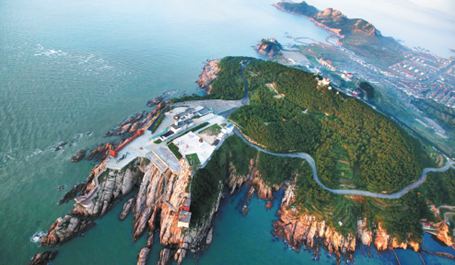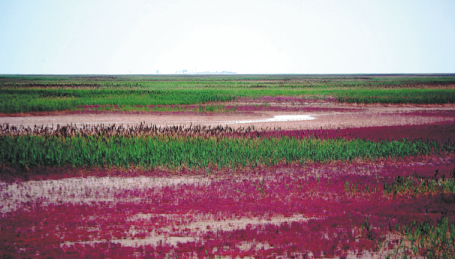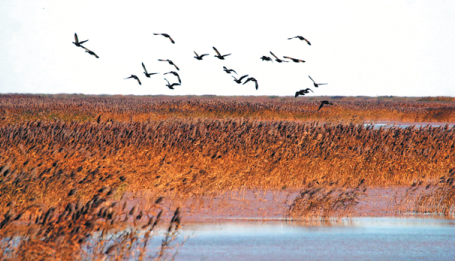If the Yellow River's estuary is calling, it must be Autumn
By Zhao Ruixue in Jinan| (China Daily )| Updated : 2019-10-09
Print Print
The Chengshan
Mountain Head located in Weihai is on the most eastern point of China's
coastline. [Photo provided to chinadaily.com.cn]
It's the time when guests, winged or not, throng the wetland and give it a vibrant hue
As we approach mid-Autumn, the Yellow River estuary ecotourism area, where China's second largest Yellow River flows into the Bohai Sea, transforms into a popular tourist destination, with visitors arriving to watch other, winged, guests and take in the wetland's vibrant and colorful landscape.
Dongying city in East China's Shandong province, just five hours' drive from Beijing, is a good stopover choice for a self-driving travel along the province's north coastline.
Covering 153,000 hectares, the Yellow River estuary area is home to more than 1,600 types of wild animals, including 368 kinds of birds. Among them, 12 species of birds belong to the most protected clan in China. It also boasts of more than 390 varieties of plants spread over 55 percent of the area.
In autumn, a vast expanse of reeds dot the shining water surface with flocks of widgeons and spotbilled ducks flying over. There are also egrets twittering in the woods and whooper swans resting on the lake, making the area one of the most beautiful wetlands in China.
Drive east from the area and you reach Binhai district of Weifang city, which has the world's biggest shaftless Ferris wheel.
Due to nice wind conditions and seaside views, the district is an ideal coastal venue for the annual international kite festival, which sees over 30 countries and regions attending.
Bordering on the east of Weifang is Yantai, a city with a 909-km long coastline dotted with a few famous tourist sites.
Among them is the Penglai Pavilion, built during the Song dynasty in the 11th century and expanded into a 100-hectare complex with moats during the Ming dynasty (1368-1644).

The wetland
landscape at the Yellow River estuary ecotourism area.Ju Chuanjiang/for China
Daily
Penglai is widely known to the Chinese as a place where eight immortals set out in search of the lands of eternity. For those with children, Penglai Ocean Aquarium is adjacent to the pavilion and claims to be one of the biggest aquariums in Asia.
Taking ships at Penglai, tourists can reach Changdao, which has 32 picturesque islands, of which 10 are inhabited. A three-and-a-half hours' yacht ride can take tourists to some uninhabited islands in the deep sea.
Taking the coastline highway, tourists can reach scenic spots, including the Yantai Mountain, famous for its century-old architecture; the Piano Museum where around 300 ancient pianos showcase how the piano culture developed in the western countries; and Yangma Island, where tourists can appreciate the sea view by driving along the 37-km long round-island highway.
Seaside restaurants are there, serving fresh seafood.
To the east of Yantai is Weihai, a city whose air quality takes the lead among coastal cities.
Coastline at Weihai is dotted with Liugong Island which has been an important strategic location since the Qing Dynasty (1644-1911) and known as the "birthplace of China's first modern navy", the 500,000 square meter pine-covered areas where tourists can relax in hot springs and the seaside wild animal zoo.
The Chengshan Mountain Head located on the most eastern point of the coastal province is said to be the place in China where one can view sun rise at sea at the earliest. Tourists can even travel the southern coastline of the province to appreciate more attractions.
zhaoruixue@chinadaily.com.cn

The wetland at the Yellow River estuary ecotourism area is carpeted by widespread plants in autumn. Ju Chuanjiang/for China Daily
